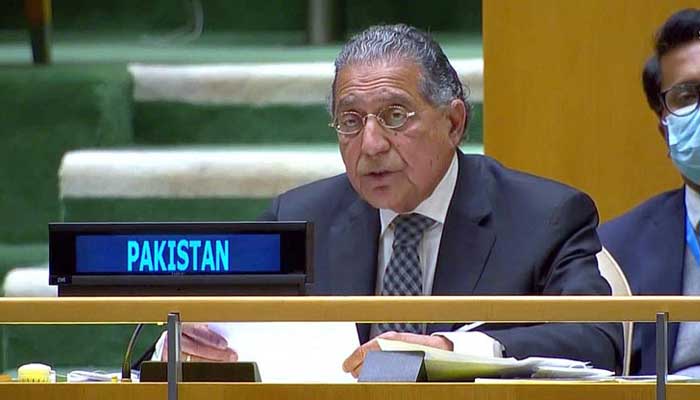UNITED NATIONS, : Reaffirming its commitment to the goal of a nuclear weapons-free-world, Pakistan told the U.N. that India was responsible for introducing nuclear weapons in South Asia with a test of an atomic device in 1974, forcing Pakistan to follow suit.
“In South Asia, nuclear weapons capability was introduced by one state in 1974,” Ambassador Munir Akram said, without naming India.
“That state also initiated the South Asia nuclear weapons explosions in 1998,” he said, adding, “Pakistan was compelled to follow suit in order to restore strategic stability and deter the aggression against it.”
Following the South Asia nuclear tests, Ambassador Akram said that Pakistan proposed the establishment of a Strategic Restraint Regime (SRR) in South Asia, to be premised on three interlocking and mutually reinforcing elements of conflict resolution, nuclear and missile restraint and conventional arms balance.
The Pakistani envoy, who was speaking at an event to commemorate the ‘International Day for the Total Elimination of Nuclear Weapons’, reaffirmed Pakistan’s commitment to the goal of a nuclear weapons-free world that is achieved in a universal, verifiable and non-discriminatory manner, assuring undiminished security for all States at the lowest possible level of armaments.
“The proposal remains on the table,” Ambassador Akram said, adding that Pakistan’s security policy continues to be defined by restraint and responsibility and avoidance of a mutually debilitating arms race in the region.
Pakistan, he said, strongly supports all international efforts seeking to promote fair and equitable solutions to disarmament and non-proliferation challenges.
“Discriminatory approaches, double standards and selectivity in the application of global norms not only weaken global disarmament efforts; they also undermine the non-proliferation regime and the international order based on the principles of the UN Charter and International Law.”
At the outset, Ambassador Akram referred to a number of global challenges, including the raging conflicts in Ukraine and in 50 other places around the world, saying tensions between the two most powerful States have continued to escalate.
“We are witnessing new and expanding military blocs; a comprehensive arms race; erosion of long-standing arms control agreements; the development and deployment of huge arsenals of advanced conventional and strategic weapons, including modernization of huge nuclear arsenals; and doctrines which envisage the use of conventional weapons despite the danger of nuclear escalation.”
“The danger of nuclear war is today closer than it has been since the (1962) Cuban missile crisis,” he warned
The event was held as the high-level annual debate in the UN General Assembly Hall came to an end.
Earlier, UN Secretary-General Antonio Guterres observed that “nuclear sabres are again being rattled” in a world that has “spent too long under the shadow of nuclear weapons” as he delivered opening remarks.
“Let’s make history by consigning nuclear weapons to history,” he added.
To do so, however, nuclear-weapon States must lead the way, the UN chief stressed, calling on them to meet their disarmament obligations.
Any use of nuclear weapons would unleash a humanitarian catastrophe of epic proportions. “This is the timeless message of the hibakusha — the survivors of Hiroshima and Nagasaki,” he said, adding that the “New Agenda for Peace” can help usher in a nuclear-weapon-free world.



Comments are closed.